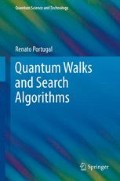Abstract
Grover’s algorithm is a search algorithm originally designed to look for an element in an unsorted database with no repeated elements. If the database elements are stored in a random order, the only available method to find a specific element is an exhaustive search. Usually, this is not the best way to use databases, especially if it is queried several times. It is better to sort the elements, which is an expensive task, but performed only once. In the context of quantum computing, storing data in superposition or in an entangled state for a long period of time is not an easy task. Because of that, Grover’s algorithm is introduced following an alternative route, which shows its wide applicability.
Access this chapter
Tax calculation will be finalised at checkout
Purchases are for personal use only
Notes
- 1.
Markov’s inequality provides an upper bound for the probability that a nonnegative function of a random variable is greater than or equal to some positive constant.
References
Aharonov, D.: Quantum computation – a review. In: Stauffer, D. (ed.) Annual Review of Computational Physics, vol. VI, pp. 1–77. World Scientific, , Singapore (1998)
Ambainis, A., Kempe, J., Rivosh, A.: Coins make quantum walks faster. In: Proceedings of the Sixteenth Annual ACM-SIAM Symposium on Discrete Algorithms, SODA, pp. 1099–1108 (2005)
Bennett, C.H., Bernstein, E., Brassard, G., Vazirani, U.V.: Strengths and weaknesses of quantum computing. SIAM J. Comput. 26(5), 1510–1523 (1997)
Boyer, M., Brassard, G., Høyer, P., Tapp, A.: Tight bounds on quantum searching. Forstschritte Der Physik 4, 820–831 (1998)
Brassard, G., Høyer, P., Mosca, M., Tapp, A.: Quantum amplitude amplification and estimation. Quant. Comput. Quant. Inform. Sci., AMS Contemp. Math. Ser. 305, 53–74, (2002), quant-ph/0005055
Grover, L.K.: Quantum computers can search arbitrarily large databases by a single query. Phys. Rev. Lett. 79(23), 4709–4712 (1997)
Grover, L.K.: Quantum mechanics helps in searching for a needle in a haystack. Phys. Rev. Lett. 79(2), 325–328 (1997)
Grover, L.K.: Quantum computers can search rapidly by using almost any transformation. Phys. Rev. Lett. 80(19), 4329–4332 (1998)
Kaye, P., Laflamme, R., Mosca, M.: An Introduction to Quantum Computing. Oxford University Press, Oxford (2007)
Mosca, M.: Counting by quantum eigenvalue estimation. Theor. Comput. Sci. 264(1), 139–153 (2001)
Nielsen, M.A., Chuang, I.L.: Quantum Computation and Quantum Information. Cambridge University Press, New York (2000)
Zalka, C.: Grover’s Quantum Searching Algorithm is Optimal. (1997), quant-ph/9711070
Author information
Authors and Affiliations
Rights and permissions
Copyright information
© 2013 Springer Science+Business Media New York
About this chapter
Cite this chapter
Portugal, R. (2013). Grover’s Algorithm and Its Generalization. In: Quantum Walks and Search Algorithms. Quantum Science and Technology. Springer, New York, NY. https://doi.org/10.1007/978-1-4614-6336-8_4
Download citation
DOI: https://doi.org/10.1007/978-1-4614-6336-8_4
Published:
Publisher Name: Springer, New York, NY
Print ISBN: 978-1-4614-6335-1
Online ISBN: 978-1-4614-6336-8
eBook Packages: Physics and AstronomyPhysics and Astronomy (R0)

